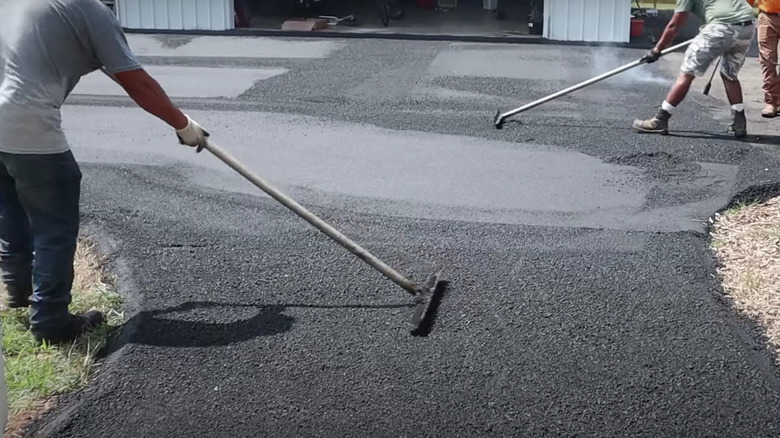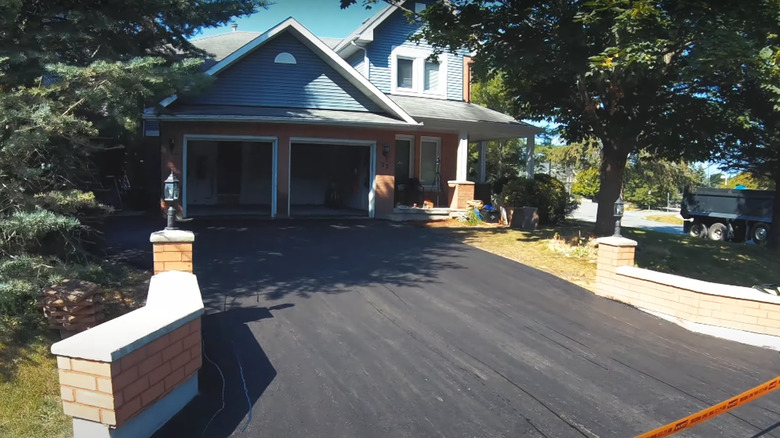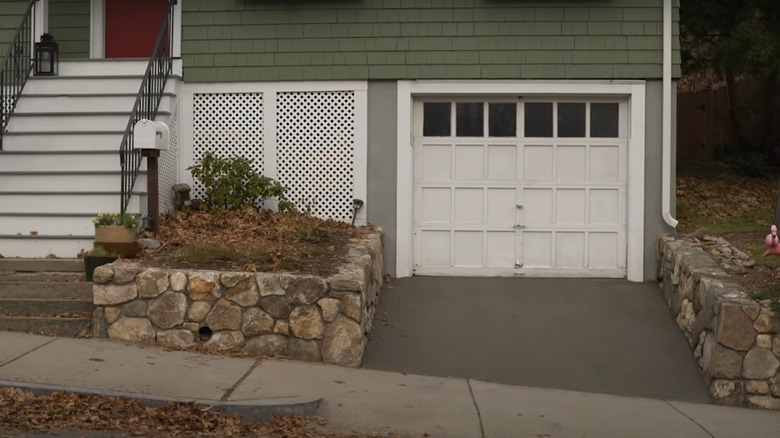Asphalt Vs. Concrete: Which Should You Use On Your Driveway?
Redoing your front driveway can be just the thing to bring new life to the front of your home. Over time driveways can experience cracking and separating and in the case of brick or paver driveways, they might come loose or fall out of level with the rest of the surface. Especially if you are deciding to sell your home, taking the time to hire a professional and modernize the front of your property could do wonders for your home's curb appeal and add value, according to HGTV.
There are many paths to take when looking for what aesthetic driveway you want. For more country homes with a longer drive, some may lean towards a gravel finish, which can be quite inexpensive and still have a nice look, explains Forbes. Otherwise, brick and paver driveways can give you more choices when it comes to design, color, and layout and can also add a sophisticated look to most houses.
However, the two most common driveway materials are asphalt and concrete. Both are widely available, quite reasonable with regard to the overall cost, and can be durable enough to last decades of wear and tear. But when it comes down to deciding between the two, which one is right for you? Let's take a look at asphalt and concrete driveways and see which material can best suit your property.
Pros and cons of an asphalt driveway
Asphalt is a hardtop surface material made of sand, rock, and asphalt cement and is most commonly used for streets and roads. Because of its ability to be easily lifted, crushed down, and then reused again and again, it makes it the ideal material for major motorways. Getting your driveway finished using asphalt will cost you around $7 to $13 per square foot and if properly maintained could last anywhere from 15 to 30 years, according to Forbes. With its attractive dark color, asphalt can fit the aesthetic of almost any home.
Because asphalt is porous, it is able to let water pass right through and is simple to maintain. The flat surface can make shoveling snow or sweeping dirt and debris easier than it would on a more textured hard top, notes Main Infrastructure. Although the material can last a long time, it needs to be sealed with a special sealant and it can take up to three months to properly cure after it has been laid. In this timeframe, you have to be extra careful not to do anything that could ruin the setting process. Asphalt can also contract during the cold months and expand in warmer weather, which could lead to cracking. Luckily, this material can be easily maintained and patched up, and routinely sealing the driveway should help to ward off the additional wear from the elements.
Pros and cons of a concrete driveway
Concrete is another common material used not only for driveways but sidewalks as well. Made of crushed stone, sand, and cement and then sealed together with water, concrete dries to a shade of gray and is incredibly strong and durable. Much like asphalt, concrete is widely available and you can have a driveway paved for around $4 to $8 per square foot, as per Forbes. Due to its lighter color, it is able to stay cooler in warm climates as it doesn't absorb much of the sun's heat, according to Testa Asphalt Paving. However, due to its light color, it can be prone to visible stains such as oil from your vehicle or spilled paint. Because it is a porous material, it can be fairly difficult and time-consuming to remove these blemishes.
This durable material can last up to 40 years and won't need the routine sealant that an asphalt driveway would require. However, unlike asphalt, concrete is not as easily repairable if cracks or holes appear. If too many of these deficiencies are present, it might mean that it is time to tear up the material and redo the whole pathway. Although cracks in concrete don't tend to happen for quite some time — unless in a climate with vast changes in weather — if you're thinking of having a large driveway done, then you may want to consider asphalt because of its ability to be easily repaired.


